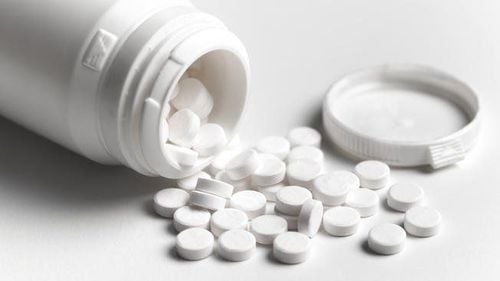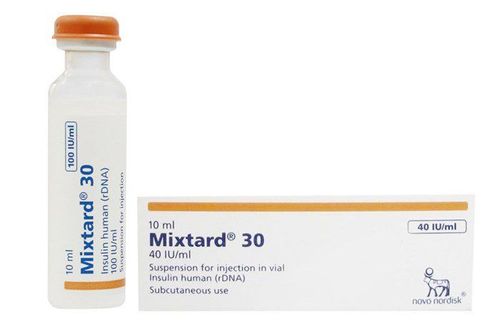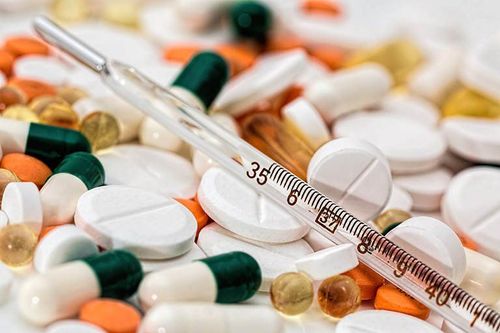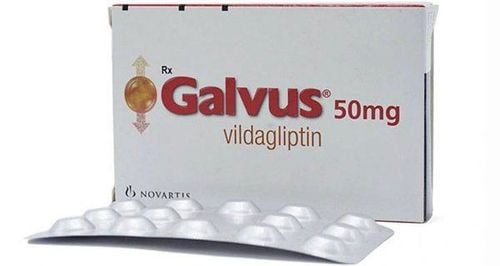This is an automatically translated article.
Sulfonylurea is a group of oral antidiabetic drugs commonly used, one of which is the active ingredient Gliclazide. There are many products on the market that contain this active ingredient, among them Gliclada 60 mg. So how should patients use Gliclada 60 mg?
1. What is Gliclada 60 mg?
Gliclada 60 mg drug has the main active ingredient is Gliclazide 60 mg and some excipients such as Hypromellose 100 mPa.s/Type 2208, Lactose monohydrate, Silica, Colloidal anhydrous, Magnesium Stearate.
2. Pharmacology of the drug Gliclada 60 mg
Gliclada 60 mg is an oral antidiabetic drug of the sulfonylurea class. The gliclazide in the drug Gliclada 60 mg is a nitrogen heterocyclic derivative.
The mechanism of hypoglycaemia of Gliclada 60 mg is stimulation of β cells of the islets of Langerhans to secrete insulin. In addition to its effects on sugar metabolism, Gliclada 60 mg also has effects on blood vessels.
Pharmacokinetics of Gliclada 60 mg:
Absorption: Gliclazide concentrations increase gradually during the first 6 hours, then reach steady state and are maintained for 6 to 12 hours after administration of Gliclada 60 mg. Active ingredient Gliclazide is easily absorbed from the gastrointestinal tract and food does not affect the rate and extent of drug absorption; Distribution: Approximately 95% of the absorbed drug is bound to plasma proteins. A single daily dose of Gliclada 60 mg extended-release tablet can effectively maintain Gliclazide plasma concentrations for more than 24 hours; Metabolism: Gliclazide is metabolized mainly in the liver and excreted in the urine; Elimination: The half-life of Gliclada 60 mg is approximately 12 to 20 hours.
3. Indications and contraindications of the drug Gliclada 60 mg
Gliclada 60 mg is indicated for use in adults with non-insulin dependent diabetes mellitus (type 2) when blood glucose cannot be controlled by other measures such as dietary changes, exercise. exercise and lose weight.In addition, Gliclada 60 mg has the following contraindications:
Patients with hypersensitivity to Gliclazide, other sulfonylurea drugs, sulphonamide groups or any of the excipients contained in Gliclada 60 mg; Type 1 diabetes; Pre-coma and coma due to hyperglycemia or ketoacidosis; Severe infection, severe trauma or patient preparing for major surgery; Severe kidney or liver failure; The patient is being treated with miconazole ; Women are breastfeeding.
4. Instructions for using Gliclada 60 mg
Gliclada 60 mg orally, once daily at breakfast. The patient should swallow the tablet whole with water.
The specific dosage of Gliclada 60 mg is as follows:
Starting dose:
The starting dose is 30mg/day (1⁄2 Gliclada 60mg tablets); If the patient's blood sugar is controlled, continue at this dose; If blood sugar is not controlled, the dose can be increased to 60, 90 or 120 mg/day. Note that between 2 consecutive dose increases should be at least 1 month apart, except for cases where blood sugar does not decrease after 2 weeks of treatment; The maximum dose is 120mg/day (2 Gliclada 60mg tablets). Gliclada 60 mg can be used as an alternative to other oral antidiabetic agents. However, the dosage and half-life of previously administered drugs should be calculated before substituting with Gliclada 60 mg extended-release tablets.
As an alternative to a sulfonylurea with a long half-life, the patient should stop taking that drug a few days before taking Gliclada 60 mg to avoid the synergistic effect of the two products (which can cause hypoglycaemia). ).
Gliclada 60 mg can be used in combination with other antidiabetic agents, including biguanides, alpha-glucosidase inhibitors or insulin.
Dosage of Gliclada 60 mg in special patients:
Elderly: The dose of Gliclada 60 mg is similar to that in patients under 65 years of age; Patients with mild to moderate renal impairment: The dose is similar to that in subjects with normal renal function but requires more careful monitoring of the patient; Patients at risk of hypoglycemia such as malnutrition, severe endocrine disorders or difficult to compensate (including hypopituitarism, hypothyroidism, adrenal insufficiency) who discontinue corticosteroids after prolonged treatment or doses high and in patients with severe vascular disease (eg, severe coronary artery disease, severe carotid insufficiency, diffuse vascular disease): Start with a minimum dose of 30 mg/day (1⁄2 Gliclada 60 mg tablets); Children and Adolescents: There are no clinical data on the efficacy and safety of Gliclada 60 mg when used in this population.
5. Precautions when using Gliclada 60 mg
Risk of hypoglycemia:
Gliclada 60 mg is only used for patients with a moderate diet. It is important for the patient to add a steady amount of carbohydrates regularly to limit the risk of hypoglycemia; Hypoglycaemia due to Gliclada 60 mg has a high risk of occurring in people with a low-calorie diet, prolonged or strenuous exercise, alcohol consumption, or a combination of other hypoglycemic agents; Clinicians need to carefully select patients with the appropriate dose of Gliclada 60 mg and clear instructions for use to reduce the risk of severe hypoglycemia; Several factors increase the risk of hypoglycemia when taking Gliclada 60 mg: Patients who do not or cannot cooperate with their doctors (especially elderly patients); Malnutrition, eating at the wrong time, skipping meals, changing diets or fasting; Imbalance between exercise and carbohydrate intake; CKD; Severe liver failure; Gliclazide overdose; Some endocrine disorders such as thyroid disorders, pituitary insufficiency, adrenal insufficiency. Renal and hepatic impairment: The pharmacokinetics and pharmacodynamics of Gliclada 60 mg may be variable in this population. In particular, the duration of hypoglycaemia can be prolonged, so it is necessary to prioritize monitoring.
Blood glucose control in patients with diabetes can be influenced by many factors such as fever, trauma, infection or surgical intervention. In some cases it may be necessary to switch to insulin control. The hypoglycaemic effect of oral antidiabetic agents, including Gliclada 60 mg, is impaired over time possibly due to disease progression or decreased response to the drug.
Testing for hemoglobin A1c (HbA1c) or fasting venous blood sugar is recommended in evaluating the effectiveness of Gliclada 60 mg.
Oral sulfonylurea antidiabetic agents, such as Gliclada 60 mg, can cause hemolytic anemia in G6PD-deficient patients, so caution should be exercised and drug substitution considered if necessary.
There are no studies on the use of Gliclada 60 mg in pregnant patients, and with other oral antidiabetic agents there are also limited data. Therefore, Gliclada 60 mg is not indicated for this subject. Animal studies have shown that Gliclazide is not teratogenic. Patients need optimal control of blood sugar before pregnancy to minimize the risk of birth defects. All forms of oral hypoglycemic drugs are not suitable for pregnant women. Insulin will be the first choice and alternative to oral medications during pregnancy.
No studies have confirmed that gliclazide or its metabolites are excreted in human milk. Because of the risk of neonatal hypoglycemia, Gliclada 60 mg is contraindicated in lactating women.
6. Gliclada 60 mg . side effects
Hypoglycaemia is the most common side effect when using Gliclada 60 mg:
Similar to other sulfonylurea drugs, Gliclada 60 mg can cause hypoglycemia if the patient does not eat and drink in moderation. Symptoms of hypoglycemia may include headache, intense hunger, nausea, vomiting, fatigue, sleep disturbances, agitation, aggression, lack of concentration, decreased cognition, and mood disturbances. sensations, slow reactions, depression, visual disturbances, language, tremor, dizziness, weakness, feeling of helplessness, loss of self-control, delirium, convulsions, shallow breathing, slow heart rate, sadness sleep, loss of consciousness, possible coma and death; Usually, the symptoms of hypoglycemia will go away after the patient is given sugar supplements. Sulfonylureas such as Gliclada 60 mg can cause recurrent hypoglycemia even at optimally effective doses. Some other undesirable effects of Gliclada 60 mg:
Digestive disorders: abdominal pain, nausea, vomiting, indigestion, diarrhea, constipation. To limit the patient should take Gliclada 60 mg in the morning; Gliclada 60 causes Rash, pruritus, urticaria, erythema, bullous reactions (Stevens-Johnson syndrome, toxic epidermal necrolysis); Very rarely, hematologic changes, including anemia, leukopenia, thrombocytopenia, and agranulocytosis, were reversible upon discontinuation of Gliclada 60 mg; Increased liver enzymes (AST, ALT, alkaline phosphatase), hepatitis. Patients should discontinue treatment with Gliclada 60 mg if cholestatic jaundice occurs; Transient visual disturbances may occur, particularly at the beginning of treatment, due to changes in blood sugar levels.
7. Gliclada 60 mg . drug interactions
7.1. Interactions with drugs that increase the risk of hypoglycemia The combination of Gliclada 60 mg with the following drugs is contraindicated: Miconazole.
Co-administration of Gliclada 60 mg with the following drugs is not recommended:
Phenylbutazone ; Alcohol. Drug combinations requiring precautions:
Other antidiabetic drugs, such as insulin, acarbose, biguanide; Fluconazole; Angiotensin-converting enzyme inhibitors: captopril, enalapril; Histamine H2 receptor antagonists; Inhibits MAOIs; Sulfonamides; Non-steroidal anti-inflammatory drugs. 7.2. Drug interactions causing hyperglycemia Co-administration of Gliclada 60 mg with the following drugs is not recommended:
Danazol; Combinations requiring precautions:
Chlorpromazine; Glucocorticoids; Ritodrine, salbutamol, terbutaline. 7.3. Drug combinations to consider Gliclada 60 mg combination with anticoagulants (e.g. warfarin): sulfonylurea drugs may potentiate the anticoagulant effect, requiring appropriate adjustment of the anticoagulant dose.
Gliclada 60 mg drug has the active ingredient Gliclazide. Gliclada 60 mg is indicated for use in adults with non-insulin dependent diabetes mellitus (type 2) when blood sugar cannot be controlled by other measures such as dietary changes, exercise. and lose weight. To ensure the effectiveness of treatment and avoid unwanted side effects, patients need to strictly follow the instructions of the doctor, professional pharmacist.
Follow Vinmec International General Hospital website to get more health, nutrition and beauty information to protect the health of yourself and your loved ones in your family.
Please dial HOTLINE for more information or register for an appointment HERE. Download MyVinmec app to make appointments faster and to manage your bookings easily.













